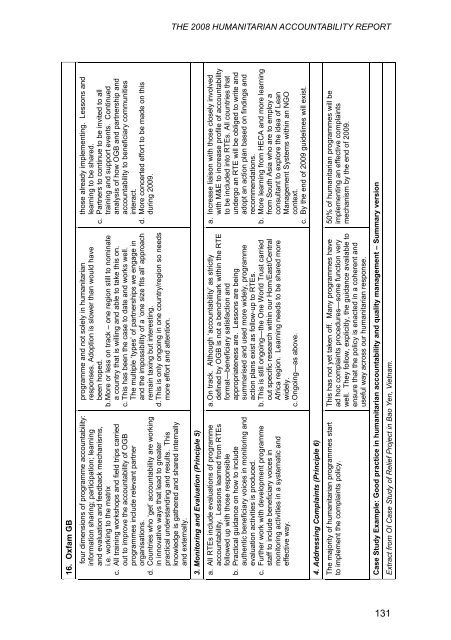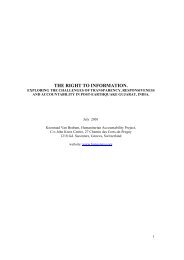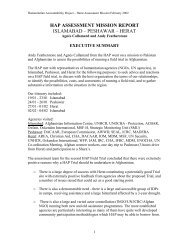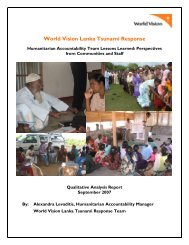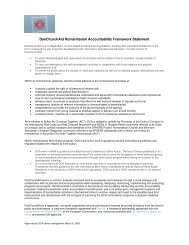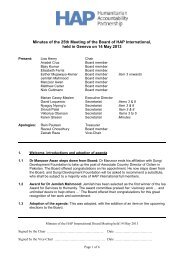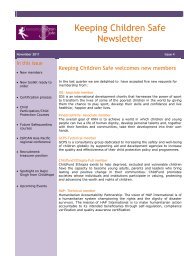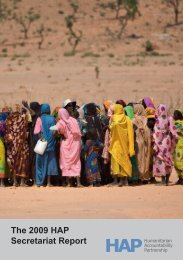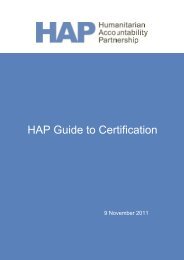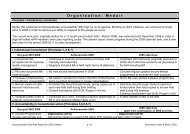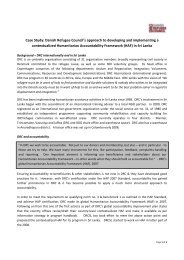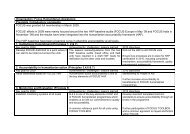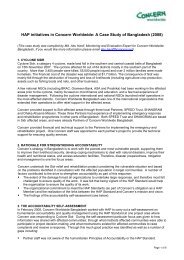Chapter Four - HAP International
Chapter Four - HAP International
Chapter Four - HAP International
You also want an ePaper? Increase the reach of your titles
YUMPU automatically turns print PDFs into web optimized ePapers that Google loves.
THE 2008 HUMANITARIAN ACCOUNTABILITY REPORT<br />
16. Oxfam GB<br />
four dimensions of programme accountability:<br />
information sharing; participation; learning<br />
and evaluation and feedback mechanisms,<br />
i.e. working to the matrix<br />
c. All training workshops and field trips carried<br />
out to improve the accountability of OGB<br />
programmes include relevant partner<br />
organisations.<br />
d. Countries who ‘get’ accountability are working<br />
in innovative ways that lead to greater<br />
practical understanding and results. This<br />
knowledge is gathered and shared internally<br />
and externally.<br />
programme and not solely in humanitarian<br />
responses. Adoption is slower than would have<br />
been hoped.<br />
b. More or less on track – one region still to nominate<br />
a country that is willing and able to take this on.<br />
c. This has been the case to date and works well.<br />
The multiple ‘types’ of partnerships we engage in<br />
and the impossibility of a ‘one size fits all’ approach<br />
remain taxing but interesting.<br />
d. This is only ongoing in one country/region so needs<br />
more effort and attention.<br />
those already implementing. Lessons and<br />
learning to be shared.<br />
c. Partners to continue to be invited to all<br />
training and support events. Continued<br />
analysis of how OGB and partnership and<br />
accountability to beneficiary communities<br />
interact.<br />
d. More concerted effort to be made on this<br />
during 2009.<br />
3. Monitoring and Evaluation (Principle 5)<br />
a. All RTEs include evaluations of programme<br />
accountability. Lessons learned from RTEs<br />
followed up with those responsible<br />
b. Practical guidance on how to include<br />
authentic beneficiary voices in monitoring and<br />
evaluation activities is produced.<br />
c. Further work with development programme<br />
staff to include beneficiary voices in<br />
monitoring activities in a systematic and<br />
effective way.<br />
a. On track. Although ‘accountability’ as strictly<br />
defined by OGB is not a benchmark within the RTE<br />
format—beneficiary satisfaction and<br />
appropriateness are. Lessons are being<br />
summarised and used more widely, programme<br />
action plans exist as follow-up to RTEs.<br />
b. This is still ongoing—the One World Trust carried<br />
out specific research within our Horn/East/Central<br />
Africa region. Learning needs to be shared more<br />
widely.<br />
c. Ongoing—as above.<br />
a. Increase liaison with those closely involved<br />
with M&E to increase profile of accountability<br />
to be included into RTEs. All countries that<br />
undergo an RTE will be obliged to write and<br />
adopt an action plan based on findings and<br />
recommendations.<br />
b. More learning from HECA and more learning<br />
from South Asia who are to employ a<br />
consultant to explore the idea of Lean<br />
Management Systems within an NGO<br />
context.<br />
c. By the end of 2009 guidelines will exist.<br />
4. Addressing Complaints (Principle 6)<br />
The majority of humanitarian programmes start<br />
to implement the complaints policy.<br />
This has not yet taken off. Many programmes have<br />
ad hoc complaints procedures—some function very<br />
well. They follow, explicitly, the guidance available to<br />
ensure that the policy is enacted in a coherent and<br />
useful way across our humanitarian response.<br />
50% of humanitarian programmes will be<br />
implementing an effective complaints<br />
mechanism by the end of 2009.<br />
Case Study Example: Good practice in humanitarian accountability and quality management – Summary version<br />
Extract from OI Case Study of Relief Project in Bao Yen, Vietnam.<br />
106<br />
131


